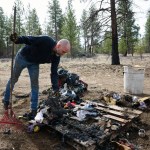In Central Oregon, sweep forces hundreds of homeless from the forest
Published 9:22 am Thursday, May 1, 2025





A stroller stood abandoned among pine trees with scorched trunks. A pair of blue jeans with legs splayed lay atop a heap of pine needles and ash. An empty chrome dog bowl squatted before an abandoned RV.
These are just a few of the things some of the hundreds of campers deserted after they were compelled to leave the forest surrounding China Hat Road. Many had called the 900-acre tract of land, part of the Deschutes National Forest, home for years.
The U.S. Forest Service on Jan. 22 announced the Cabin Butte Vegetation Management Project will close the area for one year beginning on May 1. Forest Service rangers ramped up visits to the encampment in the months that followed. With each stop, rangers informed campers that those who refuse to leave before the closure may face up to $5,000 fines and a year in jail.
Trending
The contentious move comes as record numbers of homeless people have been reported in Central Oregon. Advocates and providers who had tried to help campers find housing or alternate campsites say they’ve been hamstrung by limited time and resources.
Chuck Hemingway is one of those advocates. He said that, because shelters and safe parking sites in Bend and Redmond are at capacity, he spearheaded the filing of a lawsuit seeking a temporary restraining order to give campers more time to find new places to stay. But a U.S. District Court judge in Eugene on Tuesday denied Hemingway’s request for a temporary restraining order, clearing the way for what the National Homelessness Law Center said may be “the largest federal eviction of homeless people in the U.S.”
To prepare for a potential influx of unhoused people leaving China Hat, Bend and Deschutes County officials approved a temporary safe stay area in Juniper Ridge. But with new encampment sweeps being planned, many of the unhoused campers didn’t know where to go.
‘They want us to vanish’
The sweep is intended to ensure campers’ safety as the Forest Service conducts controlled burns and cleaning of unauthorized campsites where trash and hazardous materials have accumulated, according to Forest Service officials.
“Cleanup efforts need to be coordinated and conducted in some areas before implementation can continue to provide a safe work environment,” Forest Service officials told FORJournalism in a written statement.
But many campers, like Brooke-Lyn Lamb, doubt that anyone’s concerned with their well-being.
Trending
“Most of the people out here don’t have the means to move their things,” Lamb said on an unseasonably warm afternoon in late March. Lamb’s fiancé, T.J., worked nearby, raking the remains of a burnt pile of trash.
Stellar’s jays called to one another in the treetops. They went silent when a red-tailed hawk shrieked, circling overhead. In the silence that followed, Lamb choked back tears.
“They’re straight-up bullying us,” she said. “They want us to move right now — but where will we go? We have nowhere to go.
“It’s like they just expect us to vanish,” she added after a tense pause.
‘Who do you wanna fight today?’
Weston Harrel, a self-described vagabond who’s lived in Slab City, in Niland, California, had been camping at China Hat for about 90 days when he spoke with FORJournalism in April.
A commercial fisherman who’s originally from Alaska, Harrel said he’s been in Bend on and off for more than 20 years, and he’s more confused than ever.
“Any time I’m camping in Bend,” Harrel said, “the city police tell me to go to China Hat. Now that I’m at China Hat, the rangers are telling me to go to Dirt World in Bend. One ranger told me that I should go to Alabama.”
Harrel went silent as he noticed a Forest Service SUV creeping slowly through the unofficial roads that crisscross the forest, leaving billowing clouds of dust in its wake. An unseen woman shouted obscenities nearby.
Harrel said he chooses to live a mobile lifestyle because he can’t afford to pay the exorbitant rent in Bend. He intends to pack his belongings into a Subaru Outback. Then, he’ll leave the area before rangers close and lock a new gate built just a few hundred feet south of the Lost Tracks Golf Club. But that doesn’t mean he has a destination in mind.
“What I want to know is: Where am I supposed to go?” Harrel said. “No matter where we go, it’s illegal to camp. It’s like, who do you wanna fight with this week?”
Restoring hope
Hemingway, along with five other individuals, filed the lawsuit on April 18. If successful, the lawsuit would have delayed the removal of campers from the forest until an environmental assessment that accounts for the human impact of the project is conducted, and advocates and providers can develop a plan to relocate campers.
When Hemingway first moved from Virginia to Bend in 2001, he said there were a few people camping out there.
“During the past decade, those numbers have grown rapidly along with the population and the rising cost of living in Bend,” Hemingway said.
Last year’s national Point in Time count, administered by the U.S. Department of Housing and Urban Development, found more than 770,000 homeless people in America on a single night in January 2024. Of those, 1,799 homeless people were counted in Central Oregon, according to the Homeless Leadership Coalition’s local PIT count.
A U.S. Army veteran and a retired attorney, Hemingway hoped this year’s planned sweep would end like the Forest Service’s last push to remove people from the forest in 2022.
“Rangers began citing people that year,” Hemingway said, “but the prosecuting attorney felt that the charges weren’t worth the resources required to prosecute them. To the rangers’ credit, they made a compromise.”
That compromise, Hemingway added, included checking in with people to offer fire extinguishers, and asking campers to clean excessive waste that posed a fire hazard. To that end, Central Oregon Veterans Outreach offered a tow-away trailer for trash and other items that no longer served a purpose.
This time around is different. Forest Service officials said that the Deschutes National Forest Service had been “collaborating with city and county partners to find community-driven solutions for the unhoused individuals in the China Hat area for several years.”
While waiting for a ruling on the lawsuit, Hemingway began helping campers tow broken-down RVs, travel trailers and other vehicles that campers have called home.
“I’ve known many of these people for a long time,” Hemingway said. “By and large, they’re good people. They want to be housed again. But they face significant barriers to making that a reality.
“Because of that,” Hemingway continued, “They’ve lost all hope. I’m trying to help them restore that hope.”
Enough is enough
Nicole Hopkins moved with her husband and two daughters to the subdivision across China Hat Road four years ago. Before that, they lived in St. George, Utah — another western state in which housing prices have skyrocketed since the COVID pandemic, leading to spikes in homelessness — when her husband was offered a job in Bend.
They bought their current home sight unseen. They were shocked to learn that there was an encampment of unhoused people living in the forest just across the road.
“After living in the desert for more than 10 years, we were excited to live in the woods,” Hopkins said in early April. “That excitement faded pretty quickly as the reality set in.”
But “reality” may not be the right word.
“I feel like we’re living in a movie,” she said. “Within days of moving here, we witnessed a fleet of law enforcement vehicles come flying down the road, sirens blaring. The SWAT team had been called out. There are fires and gunshots. One day we heard propane tanks exploding. It’s just unreal.”
Hopkins said that trash, campers walking near her home in the middle of the night, and cleaning up human feces on her property are some of the other challenges her family has endured since moving to the area.
Then, there’s the basketball hoop that stands in front of the Hopkins’ house. It goes unused because Hopkins worries about the safety of her 15-year-old daughter.
“We spent $20,000 to build a fence,” she said. “I also have a 7-year-old daughter who likes to play in the backyard. I feel like I can’t let my daughters out of my sight.”
Hopkins said she feels badly that some of the campers would be forced out of the area with nowhere to go, but she also said she feels a sense of relief.
“Through all of this, who’s looking out for us, for our rights as homeowners?” she asked. “I don’t want those people to suffer… I just want to go back to a quiet, peaceful life.”
Kelly Jackson and her husband live a stone’s throw from the Hopkins family. Like their neighbors, the Jacksons weren’t aware of the growing encampment across the road from their new home when they moved there four years ago.
“We knew people camped in the forest,” she clarified on a Wednesday afternoon in April. “We thought that was rad—until we realized they were homeless people.”
Within a month of moving in, Jackson said that she became unnerved as she noticed people wandering on her property, some of them hanging out on her porch during the night.
“They were drunk or high,” Jackson said. “They were yelling, sometimes at no one in particular, our dog would bark at them and wake us in the middle of the night.
“We have a hot tub in our backyard,” she continued. “I don’t remember the last time we were able to sit in it without listening to homeless people talking, yelling or fighting. Then there are the fights, the gunshots, the fires.”
In a response to Hemingway’s complaint, attorneys representing the Forest Service said that 90 of 95 fires in the China Hat area were caused by humans between the years 2020 to 2024.
Jackson said that she and her husband have acclimated to the disturbances, but she worries for the safety of their toddler.
“A year or two ago, we would have been okay if the Forest Service would have given us a buffer zone of a mile,” Jackson said. “But now, we’re happy that they’re going to get them all out of here. At some point, enough is enough.”
Back to town
While most of the neighborhood’s residents who spoke with FORJournalism want campers out by any means necessary, Tim Stacey, a landscaper who tends to their properties, wished there was more time and resources to help campers find safe landing spots.
The 50-year-old said he’s lived and worked in the area for 30 years. While he sympathizes with the homeowners’ plight, he also empathizes with campers.
“Nobody expects to be homeless,” said Stacey, sitting in his work truck while taking a break on a warm, sunny afternoon in April. “All it takes is one day and your whole life can be turned upside down.”
Stacey said that he lost everything in his 40s, after he and his wife divorced. He went from living in a four-bedroom house with his wife and kids to living in his truck.
“It’s a hard life,” he said. “I don’t wish it on anybody.”
While he recognizes the importance of managing the forest, he said that three months’ notice isn’t enough time for campers to find another place to stay.
“The government should be doing more to help these people before forcing them out,” he said. “Otherwise, they’re just going to go right back into town. They’re going to be camping in neighborhoods again.”
‘Mine are worn out’
Penny Gartner is among the people Stacey mentioned. Aged 60 and battling cancer, she struggles to live on a meager monthly Social Security check.
“I can’t afford to rent any apartment that isn’t subsidized,” she said in March. “So, I live out here.”
Her camp was situated about a quarter of a mile south of Brooke-Lyn Lamb’s. Gartner had lived in the woods for more than five years. Though she wasn’t ready to move, she spent part of each morning tearing down a fence built around her camp, burning the loose pieces of wood.
“I want to leave this place better than I found it,” she said, looking up through the branches at the bright blue sky. She, too, had heard stories of her neighbors being harassed by rangers.
“They’ve been told that the LEOs — the rangers — will pull people over if their registration’s not in order,” said Gartner. “They’ll impound vehicles that aren’t insured.”
Gartner paused there, drawing quick breaths as she began weeping.
“Most of these RVs and trailers aren’t insured, they can’t be registered,” she said. “These people are just barely surviving. They don’t have money for food. How are they supposed to come up with money to register and insure their vehicles and trailers in the next few weeks?”
Gartner smiled and said that she’s one of the lucky ones who had been offered an apartment at Cleveland Commons, a first-of-its-kind permanent supportive housing project in Bend. But she grew sullen again as she thought about her neighbors and the community she’s called home for the past five years.
“It’s devastating to think of all the people who are losing their homes,” she said. “They’re losing everything. It’s just devastating. We have hearts and souls too, and mine are worn out.”
Tear it down
Gartner’s neighbor and friend Steven Putnam has lived in the woods for four years. Since moving to the woods, he’d plied his skills to improve the area he shared with Gartner. He beamed when showing off a makeshift bathhouse that he’d built. It’s equipped with a wood-burning stove and a propane-fueled water heater. For Putnam, 63, it’s a little piece of civilization, a luxury rare among forest dwellers.
“I’ve learned to see perfection in imperfection, to make the most of very little,” Putnam said. “I’m heartbroken to have to leave it, to leave this…”
His voice trailed off there, unable to continue. Instead, he waved his hand in a half-circle, gesturing toward the clearing in the trees in which his camp stood.
Putnam said that he’d use a 1988 Toyota flatbed truck to move the bathhouse to a friend’s property. But he didn’t know what to do with the treehouse he built for Gartner on her 60th birthday.
Gartner was equally stumped.
“I’m from Manhattan Beach, California,” said Gartner. “I told Steve that I’d never climbed a tree. Next thing I knew, he was building a treehouse.”
With the life they’d come to know quickly fading, Gartner said she couldn’t bring herself to tear it down.
“If the Forest Service wants it gone,” she said looking up at a red-tailed hawk soaring in circles overhead, “they’ll have to do it themselves. I’m not going to destroy such a beautiful thing.”
Within weeks of speaking with FORJournalism, Gartner and Putnam had moved to Cleveland Commons — but not before Putnam made the painful decision to tear down the treehouse.
Helping or hurting?
Claire Herbert, an associate professor of sociology at the University of Oregon, said she has myriad concerns with encampment sweeps.
“First, they do not solve the problem,” she said. “They just shuffle the problem to another area, another agency, another municipality.”
Critics say sweeps undermine time-consuming, painstaking work done by advocates and providers who spend months building trust with the people they serve. That work is interrupted when those people are forced from encampments.
“Many of these people have experienced institutional trauma in hospitals, jails, prisons and shelters,” she said. “Because of that, they’re hesitant to seek the help they need. When that’s interrupted, the problems persist.”
During the upheaval that comes with encampment sweeps, personal items like medicine, eyeglasses and hearing aids are often lost. And, because those unhoused people have moved, their health care and other services are interrupted as providers and advocates have trouble locating their clients.
Isaac Montoya, a community health worker who coordinates care for China Hat campers, said many of his clients have left the forest since the sweep was announced in January.
“Those that remain are very sick,” Montoya said. “In addition to those who have serious illnesses — like hepatitis C, HIV, cancer — there are people who need shoulder surgery or hip replacements. How do they expect these people to pack up their belongings and move?”
Montoya said that he works with a number of organizations in Bend, so he’s worked with many unhoused people over the years.
“The reality of poverty here has opened my eyes and changed my life,” he said. “Many of the people at China Hat have been on waiting lists for years. The majority of them haven’t received calls to get them into housing. I lose sleep over these people.”
Montoya said he’s especially worried about one person. Though he can’t name that person due to HIPAA laws, he described that person’s symptoms broadly.
“This person has infections in both legs, which makes it impossible to walk,” Montoya said. “This person suffers from a spinal fluid leak, which means they can’t sleep — but the body needs sleep to fight infection. It’s a vicious cycle that’s made worse by this order to vacate the area.”
People in similar situations, Montoya added, may suffer more serious conditions if they lose touch with health care providers.
“People will die if we don’t do more to help,” he said.
Herbert said situations like those described by Montoya become unavoidable when unhoused people are compelled to move with nowhere to go.
“It’s heartbreaking for providers who have invested time and resources to have their processes disrupted,” Herbert said. “It’s also a waste of resources. If an agency understands best practices in these situations, they should be working to find alternative arrangements for unhoused people before removing them from an encampment.”
Herbert, who’s researching the interaction between local regulations, enforcement, and the well-being of residents experiencing unsheltered homelessness in Eugene, said that as homeless encampments on federal land have grown over the past decade, agencies like the U.S. Forest Service and the National Park Service are being increasingly called upon to remove campers.
“But few people working for those agencies have the specific training needed to help the situation,” said Herbert. “Their approach is generally to make campers so uncomfortable, they decide to leave. These sweeps do nothing to address the root causes of the problem of homelessness. They perpetuate those problems.”
When asked about the frequency with which the Forest Service conducts sweeps of unhoused campers from forests in Bend, and what kinds of training rangers receive to interact with unhoused people and those who are dealing with severe mental illnesses, the Forest Service officials said their agency is “focused on forest restoration, fuels reduction, improving wildlife habitat, and providing recreation opportunities.”
“However, we are not the lead for addressing homelessness in our communities,” Forest Officials said. “We strive to be a good partner by coordinating with those that are.”
Forest Service officials did not respond to questions about how budget constraints and mass layoffs would impact encampment sweep operations.
Let down, forgotten
Chris Grummons said he feels the discomfort and confusion described by Herbert. Grummon, 33, has lived in the China Hat area for roughly four years. The sole caregiver to his companion, Andrew Tomlinson, Grummon said that he feels trapped by the need to leave and the limited options available to him.
“We’ve talked with people about going into a shelter,” he said on April 22. “They seem to want us to surrender our freedoms and our belongings in order to live in a shelter. But the trade-off doesn’t make sense to me. We can’t even have family come visit us in most of those places.”
The first thing he said he’d have to do is get rid of the RV that he and Tomlinson call home.
“I can’t do that, because we need a place to stay when we leave a shelter,” he explained. The next option, he said, is a safe parking site. “But we’re on a waiting list, and don’t know if they’ll give us a spot before we have to leave this camp.”
Grummon wants to leave the area as soon as possible, but he’s spurred on by another problem.
“Since the rangers have told everyone to leave, people have become more brazen, more desperate,” he said. “We’ve seen more looting, robbery and violent crime out here in the past two months.
“People will loot your camp if you’re gone for more than two hours,” he added as a man on a bicycle approached. “We spend more time protecting our things than we do packing and preparing to move.”
The man on the bicycle turned out to be Grummon’s neighbor, Abrian Reiten, whose camp was on the other side of a stand of trees.
“Is everything all right?” Reiten, 38, asked.
“Yeah, we’re good,” Grummon said.
“Okay, just making sure,” said Reiten.
Grummon said that he and Reiten had begun looking out for one another as they felt increasingly threatened by would-be thieves.
Reiten, who works as a janitor for a local cleaning company, said that he’s been living in the China Hat area for about two years, after he was divorced from his wife.
“After that, I couldn’t afford rent,” he said. “So, I moved out here.”
He was disheartened when he returned to his camp one day to find a laminated flyer duct-taped to the door of his fifth-wheel camper.
“It said that we had 13 days to vacate the area,” he said, “It’s hard enough to survive out here, now we’ve got to think of this.”
Reiten’s situation took a turn for the worse after he caught people stealing from his camp.
“I confronted one of them,” Reiten said. “He was in a truck, and he rammed my truck. That’s why my front end is all messed up.”
Back at Reiten’s camp, the remains of his truck’s front end — grill, bumper and a slew of other broken parts — were gathered in the powdered dust beside his camper. But that wasn’t all. He said he was jumped by two of the man’s partners — and attacked by their dog.
“It’s still healing,” he said, drawing up his pant leg to reveal a mottled wound where the dog allegedly bit into his leg.
“To tell the truth, I feel let down, forgotten,” he added. “By the community, by society. I didn’t plan on being homeless. I work but don’t make enough to rent even a small apartment. I’ve got no option but to look for another camping spot. I just don’t know what to do.”
Homelessness: Real Stories, Real Solutions (realstoriesrealsolutions.org) is a journalism lab funded by Central Oregon Health Council under FORJournalism (forjournalism.org), an Oregon nonprofit dedicated to supporting journalism statewide. Sign up for weekly newsletters to receive updates.












